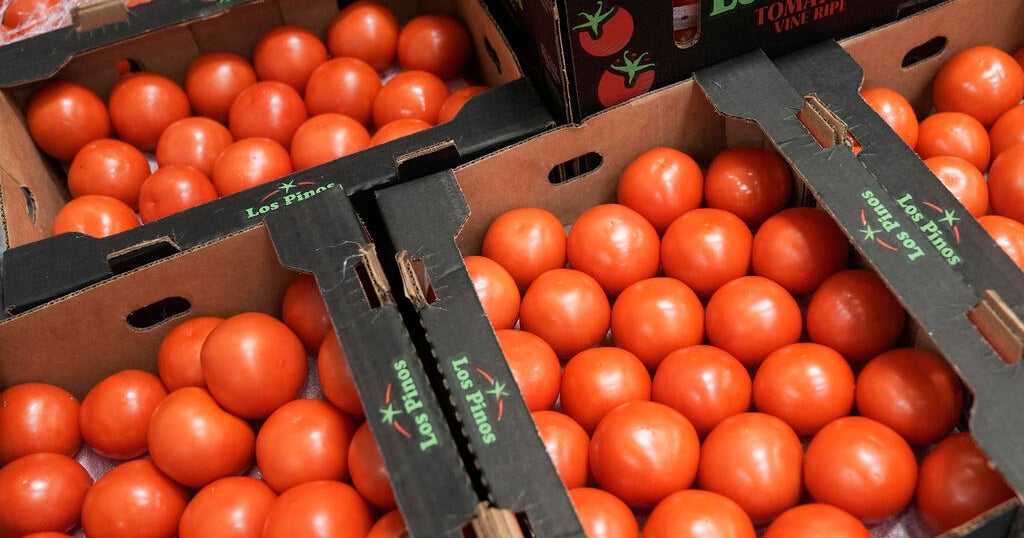

No response returned

The Trump administration is imposing a 17% tariff on most fresh Mexican tomatoes, the federal government , ending a yearslong agreement with the U.S.'s southern neighbor over trade practices.
The move comes amid a separate push by President Trump to increase tariffs on dozens of U.S. trading partners, including Mexico, which was told over the weekend to . Critics argue the president's tariff strategy could push up consumer prices. But Secretary of Commerce Howard Lutnick said in a statement Monday that the decision on tomatoes is "in line with President Trump's trade policies and approach with Mexico."
"Mexico remains one of our greatest allies, but for far too long our farmers have been crushed by unfair trade practices that undercut pricing on produce like tomatoes. That ends today," Lutnick said in a .
The U.S. gets around 70% of its tomatoes from Mexico, according to the Florida Tomato Exchange. Roughly $3 billion worth of tomatoes are exported from Mexico to the U.S. every year, an almost threefold jump over the last 15 years, .
Supporters argue the tariffs could give a boost to the domestic tomato industry, which the Florida Tomato Exchange says has been "decimated by an influx of cheap Mexican tomatoes." But others warn the move could lead to higher prices and harm U.S. companies that rely on imported tomatoes.
The tariffs follow a complicated, over allegations that Mexican tomato producers were illegally selling tomatoes to the U.S. at unfairly low prices, harming U.S. growers. The federal government in 2019 — during Mr. Trump's first term — that averted "anti-dumping" duties on tomatoes in exchange for Mexican producers agreeing to a minimum sale price.
In April, the Commerce Department the U.S. would exit that deal in 90 days, saying it "has failed to protect U.S. tomato growers from unfairly priced Mexican imports." The Commerce Department said it would impose 20.91% tariffs — slightly higher than the 17.09% levies announced Monday.
The Florida Tomato Exchange praised the move in a statement Monday. The group's executive vice president, Robert Guenther, called it "an enormous victory for American tomato farmers and American agriculture."
A group of lawmakers in Florida — which is one of the U.S.'s largest tomato-producing states — in a letter to Lutnick last month. Sen. Rick Scott, a Florida Republican, "a major victory for American growers and producers."
But the U.S. Chamber of Commerce , arguing the Trump administration should try to cut a new deal with Mexico instead. The group said "the import and sale of Mexican tomatoes generate an estimated $8.3 billion in economic benefits," and warned withdrawing from the deal could trigger retaliation from Mexico.
"Terminating the Agreement would likely have widespread repercussions on the U.S. economy, affecting agriculture, warehousing, logistics, grocery, and restaurant industries," the group said in a letter to Lutnick.
The lead-up to Monday's decision also drew criticism from some Democrats.
"ARIZONA, BUY YOUR TOMATOES NOW!!" Sen. Ruben Gallego, an Arizona Democrat, wrote on X last week. "Groceries are already too expensive. [Mr. Trump] needs to reverse this decision now."
"Salsa will be pricier, shelves emptier, and groceries more expensive. Tens of thousands of jobs, including 30,000 Texans, will be at risk," Rep. Sylvia Garcia, a Texas Democrat, on X.
Mexico's agriculture and economy ministries Monday, saying it was "unfair and against the interests not only of Mexican producers but also of the U.S. industry." They also said the massive growth in tomato exports to the U.S. "stems from the quality of the product, not from any unfair practices." The Mexican government said it expected to find a solution to the dispute.
Mr. Trump has sent letters to dozens of U.S. trading partners over the last week threatening higher tariffs starting August 1, partially reinstating some of the steep country-by-country levies that were rolled out by the Trump administration in April, but quickly delayed for 90 days. The president argues the tariffs are necessary to protect domestic jobs and correct unfair trade practices, but many economists argue tariffs can lead to sluggish economic growth and higher prices.
Food prices grew 2.9% in the 12-month period ending in May — higher than the country's overall 2.4% inflation rate, but well below mid-2022, when food prices were growing upwards of 10% year-over-year, according to federal data. The price of tomatoes from May 2024 to May 2025.
Federal Reserve Chair Jerome Powell he expects tariffs to have some impact on prices. But he added: "We really don't know how much of that's going to be passed through the consumer. We have to wait and see."




